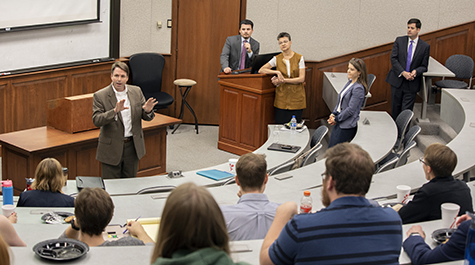Eminent domain attorneys share advice with students during annual Property Rights Conference
The 15th Annual Brigham-Kanner Property Rights Conference began Thursday, Oct. 5 with a pre-conference lunch presentation where attorneys from around the country specializing in eminent domain talked to students about their work and the importance of property law.
The seven presenters, Andrew Brigham, Joshua Baker, Christian Torgrimson, Robert Thomas, Brett Tensfeldt, Stephen Clarke and Leslie Fields, work in eminent domain law for firms that range from Jacksonville, Fla., to Honolulu, Hawaii. Each expert spoke briefly about the challenges and rewards of working with people to navigate the unique and often difficult processes of an eminent domain claim.
Throughout their presentations, the speakers reflected on the relationship between legal theory and the day-to-day realities of their work. In his opening statement, Andrew Brigham, of Brigham Property Rights Law Firm, PLLC, said, “The Brigham-Kanner Conference brings the academy and practicing attorneys together.”
Another speaker was Robert Thomas, a director of Damon Key Leong Kupchak Hastert law firm, and Joseph T. Waldo Visiting Chair in Property Rights Law at William & Mary. Thomas talked about bringing William & Mary law students to Washington, D.C., to watch property cases argued before the Supreme Court, and the importance of having passionate lawyers on both sides of eminent domain cases.
“There are a lot of holes in the American eminent domain field that need filling,” Thomas said.
The luncheon was a new addition to the Brigham-Kanner Conference this year to give some of the attendees the chance to visit with students before the main panels and presentations. Afterward, students connected with practicing bar members in a series of workshop sessions offering a unique setting where they could hone their interview skills and ask questions that would not normally be entertained by the lawyers who would be interviewing them for potential job placement.
About William & Mary Law School
Thomas Jefferson founded William & Mary Law School in 1779 to train leaders for the new nation. Now in its third century, America's oldest law school continues its historic mission of educating citizen lawyers who are prepared both to lead and to serve.
